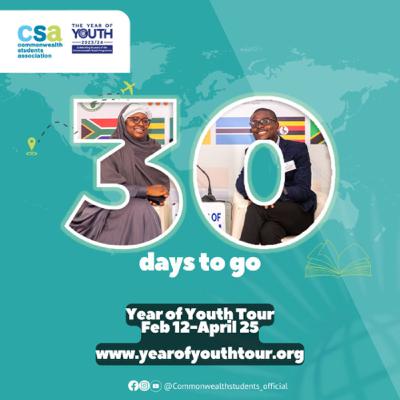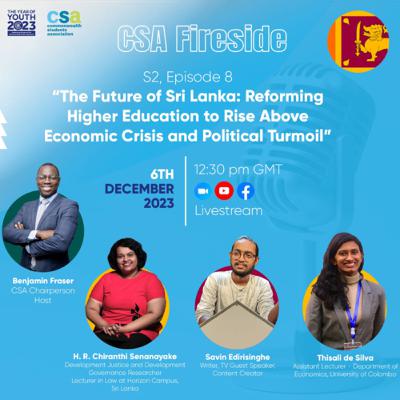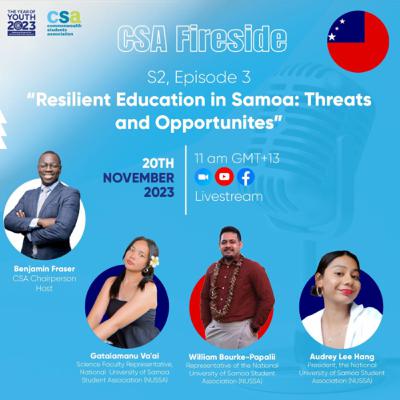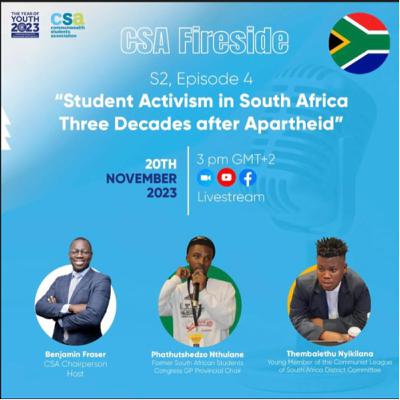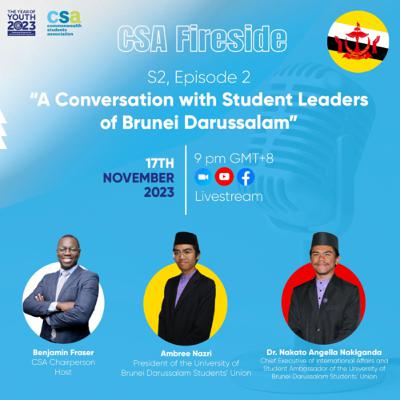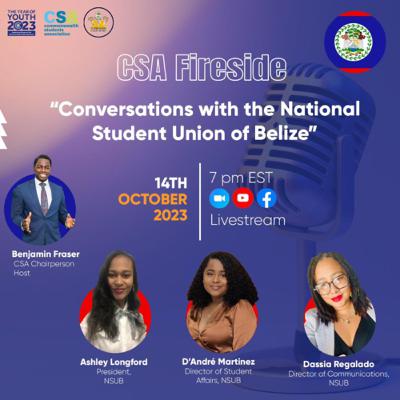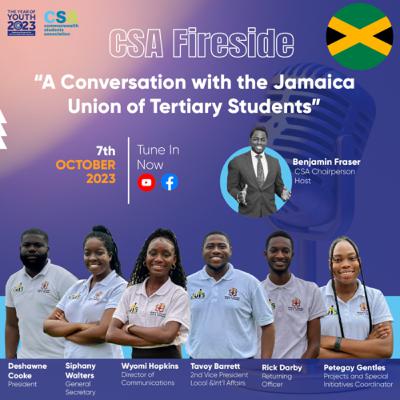Discover CSA FIRESIDE
CSA FIRESIDE

CSA FIRESIDE
Author: CSA FIRESIDE
Subscribed: 4Played: 13Subscribe
Share
© CSA FIRESIDE
Description
Leading up to the Year of Youth Engagement Tour in January 2024, the CSA will engage students from across the Commonwealth on various social media platforms with the aim of establishing connections and building momentum that will lead up to various country visits. This podcast will have a collection of all the episodes of the CSA’s talks (now and the future), a reference for its purpose, goals and achievements to the the public. Tune in and listen anytime
29 Episodes
Reverse
In this episode, we discuss violent extremism in Pakistan, We’re enlightened on how religion and politics have influenced it, its impact on higher education institutions and the students in them. We learn about the role of higher education in combatting it.
With only 30 days left for the Commonwealth Students’ Association to commence the Year of Youth Tour (2023-2024), thé planning committee holds a meeting to discuss how far they are in their readiness. The CSA’s aim is to be more transparent with most activities and meetings held in every step of it works for Commonwealth students and therefore we bring you an episode that will enlighten you on this. Listen in for your country will be visited in a few days.
The CSA Fireside podcast once hosted Malaysia in Season 1 alongside Bangladesh and Pakistan to discuss whether “the student voice is taken seriously in Asia.” With the need to understand more about this diverse nation, Malaysia returned in season 2 where we discuss the language of instruction of their Education (Malay or English); its advantages and disadvantages and; its role in the struggle to decolonise education. We further learn about Islamic Religious Education and how it prepare students for life. We could not forget the cultural diversity of Malaysia. We discuss strategies it has used to cater for non Muslim Malay students and whether this diversity has caused conflicts in the education sector.
Ceylon, officially known as the Democratic Socialist Republic of Sri Lanka is a home to many cultures, languages and ethnicities found in South Asia. In this episode, we bring you panelists who discuss with us the political history of Sri Lanka, the impacts of its current economic situation, the state of its higher education i.e. Is there equitable access to it, which programs are offered, which subject areas are prioritised for government scholarships and what roles are being played by the higher education sector in responding to political and economic challenges faced by Sri Lanka.
The Republic of the Maldives is an archipelagic state know for its distinct white Beaches and blue waters attracting a vast number of tourists to it. Tourism contributes more than 28% of GDP and 60%of foreign exchange. In this grand episode, we ponder the issues within the labour force in the Maldives; whether the country’s reliance on tourism is disproportional; the social benefits/protection for tourism workers and whether there are enough opportunities for youth outside tourism.
In a sweet twist of events, we were honoured to host thé Commonwealth Youth Council Chairperson, Mr. Kim Allen.
In this dialogue, Mr. Benjamin Fraser and Mr.Kim Allen discuss freely about the different forms of leadership,authority, micromanaging,building trust and empathy as a leader.
They further discuss the workload in their positions and delve into performance based incentive models, how they affect sustainability of youth networks, why youth/student leaders at thé Commonwealth level should be incentivised and could travel be of part these incentives?
Samoa is a Polynesian island country consisting of two main islands Savai'i and Upolu. It is a sovereign state and a member of the Commonwealth of Nations.
The CSA had a discourse with the Samoan
NSO to delve deep on the issues affecting education like the strengths and weaknesses of the education system,how the COVID-19 pandemic affected its normalcy, the effects of climate change induced natural disasters on education and the issue of bullying.
The Commonwealth Students's
Association has an Executive Committee made up of the Chairperson, Regional Representatives from the Pacific, Asia, Africa, Caribbean &Americas, Vice chair for Communications & Research, Vice Chair Advocacy & Partnerships, Vice Chair Democracy & Participation.
This team of versatile and dynamic student leaders has been entrusted with the responsibility to continue the important and necessary work to unify and amplify students voices of NSOs across the Commonwealth.
In this episode, we re-introduce EXCO
(2022-2025) who share what has been achieved and the progress of projects that are ongoing.
South Africa is a middle power in international affairs, a member of both the Commonwealth of Nations and G20. It's a multiethnic society encompassing a wide variety of cultures, languages and religions with 80% black who experienced apartheid ( institutionalised racial segregation) from 1948 to 1994.
Today we sat down with the South African
NSO to discuss how apartheid shaped education, it's lingering effects, the role students played to end the apartheid policy, as well as the it's standing on the Commonwealth student ans Safety Agreement.
Brunei is a nation on the Island of Borneo surrounded by Malaysia and the South China Sea, known for its beaches and biodiverse rainforests. It is governed by an absolute Monarchy.
The CSA sat down with student leaders of Brunei Darussalam to discuss the state of education, the value of the student voice in Brunei as well as student safety and security.
As of 2016, UNPFA reported that 43% of women 25-49 years had married by 18 years. According to Uganda Bureau of Statistics (UBOS) in 2018, almost 25% of Ugandan women had given birth by the age of 18. These figures spiked to 1025 teenage pregnancies per day in 2020 in Uganda due to the COVID-19 pandemic. In this episode, we discuss the causes,conséquences, and what needs to done to address these statistics.
Africa is the 2nd largest continent. It boasts the mountain ranges of the Kilimanjaro, dessert Saharan plains and exotic islands of Seychelles and Mauritius, inhabited by 100,000 and 1.2 million people respectively.
We sat with the CSA Country Representatives from these islands to discuss issues in education in their respective countries.
The National Students' Union of Belize (NSUB) is a young and vibrant national student organization. Belize is a nation on the eastern coast of Central America and is part of the Caribbean. Offshore, the massive Belize Barrier Reef, dotted with hundreds of low-lying cayes, hosts rich marine life. We sat with the student leaders of the NSUB who represent student interests of a nation of 400,000 to discuss student safety and security, decolonisation and student activism.
The Global Student Forum (GSF) is the global umbrella organisation of the world’s major representative, independent and democratic student unions of school and university students, representing and advocating for the educational, cultural, economic, and social interests of over 300 million learners worldwide. We were joined by the Executive Director of the Global Students Forum to discuss how the high level advocacy it does impacts the average learner in the classroom. The GSF has done extensive advocacy on tax justice, decolonization of education finance and climate justice, among other areas
Kenya is facing a youth bulge: 75% of the Kenyan population is aged below 35 years old. Youth unemployment in Kenya is as high as 35% (4.5 million young men and women), compared to the overall national unemployment rate of 10%. We sat with the past and present CSA Kenya Country Representative to discuss unemployment, education and student safety and security in Kenya.
We were joined by the CSA Nigeria Country Representative as well as senior executive members of the National Union of Nigeria Students (NANS) to discuss the impact of the removal of the oil subsidy and the ASUU strikes.
Students in Nigerian universities, particularly federal institutions, spend more years than their counterparts studying the same course in private-owned schools. The reason is not far-fetched. It is because of the constant strike of the Academic Staff Union of Universities (ASUU).
The Guyana National Students Organization (GNSO) was established in 2020 to represent the voices of students in Guyana. Shortly after it commenced working on organizing and recruiting members, the COVID-19 pandemic threatened to halt the progress of the young organization. Their determination is a testament to the quality of student leadership in Guyana and the truth that youth are interested in participating in education as stakeholders, despite challenges faced at the organizational level. Listen to current members of the GNSO executive share about their growing student movement, Education in the oil rich Caribbean nation and opportunities for the transformation of the only English speaking country in South America.
The Republic of Singapore is an island nation of 5.5 million people. It is one of 8 countries in Asia that are part of the Commonwealth. As we continue to spotlight Asia and the Pacific, we sat down with Eileen Goh, former volunteer with the Commonwealth Youth Council and former Assistant Program Officer at the Commonwealth Secretariat. We discussed the student movement in Asia and approaches to improving our engagement in the region.
The Jamaica Union of Tertiary Students (JUTS) is the national student representative body for tertiary students in Jamaica. The JUTS has been organized at a national level since 1972, by the government, in its democratisation plan within the education system.
The JUTS is an independent, democratic independent, non-profit, non-sectarian and non-partisan student organization comprising a confederation of local student representative organizations in colleges and universities across
Jamaica.
We caught up with some of the elected leaders of the JUTS in our CSA Fireside.
The New Zealand Union of Students’ Associations (NZUSA) has a long and proud history of supporting students. Since 1929, they’ve tirelessly advocated and represented students in universities and polytechnics across Aotearoa New Zealand.
On this episode, we had one of the hard conversations that is typically avoided. Our guest, Ellen Dixon, President of the NZUSA engaged us on the topic "Decolonization of Education as part of the process of Truth and Reconciliation in the Commonwealth"



